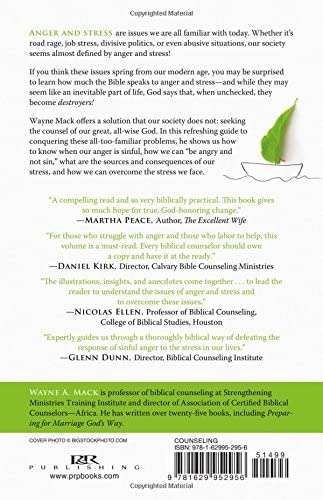Reading “Anger & Stress Management God’s Way” helped me understand that the world tries to manage anger and stresses independent from God; but we as sons and daughters of God, manage it in dependence of God. Notice that this is where all the difference is evident. All those secular techniques that exclude God, are based on the humanistic premises that say: “we alone, by ourselves, can resolve our own problems.” But we as children of God “see everything that happens to us within the framework of the Sovereignty of God.” (p. 19, ¶ 2). We “choose to give thanks to God in the midst of everything that happens (p. 97, ¶ 4). We believe in repentance. Our major need is to be forgiving, our desire is to give glory to God and our joy and peace comes from knowing that God is sovereign.
In Anger & Stress Management God’s Way, Dr. Wayne Mack has written a concise book of practical guidelines to give the reader clear, biblical direction on how God wants His children to respond to the inevitable stresses of life we encounter in this fallen world—by responding as truth-practicing and hope-filled overcomers. The handling of this difficult subject matter is made personable with anecdotes and illustrations reflecting hope and spiritual growth to be gained from biblically addressing anger and stress.
The first two chapters contrast two different types of anger—sinful anger and righteous anger. Sinful anger is always destructive, whereas righteous anger is constructive. Believers are commanded to get rid of sinful anger (Ephesians 4:31). Dr. Mack says, “Our anger is always sinful when it is caused by our selfishness” (16). Yet, he also confirms, “Controlling anger is usually a lifelong struggle” (25). In addition to selfishness, other manifestations of sinful anger highlighted include when anger is: jealous; allowed to control us; the dominant feature of our lives; accompanied by brooding or fretting; keeping a running record of mistreatments; pretending untruthfully that we are not angry, and; returning evil for evil by attacking people.
A key characteristic of selfish anger is when an individual believes his or her “rights” have been violated, and a helpful list of commonly perceived “rights” is provided. Dr. Mack reminds readers that all that we have, including our perceived “rights,” belong to God because we were purchased with a price and are no longer our own (Proverbs 24:1; Romans 12:1; 1 Corinthians 6:19). We are therefore to trust God both to know what we need and to provide it (Philippians 4:19).
To learn how to be both good and angry simultaneously, Dr. Mack gives three helpful points to consider in chapter three, and in chapter four, he outlines six sets of questions to ask oneself that can make a difference in one’s success. The three aspects to deal with anger God’s way include: dealing with problems on a regular, daily basis (Ephesians 4:26); understanding that we can control/restrain expressions of anger (Proverbs 16:32), and; examining the reasons for the anger (James 4:1-3).
There are only two ways to deal with anger as Dr. Mack points out—God’s way or man’s way. He states, “What does not come naturally is dealing with our anger in a God-honoring way” (41). An offense can be overlooked (1 Peter 4:8; Proverbs 19:11) if it is not a “fire issue” that would destroy or cause serious damage, and confronting an issue is done only when the person acts in a manner that is clearly forbidden in Scripture in explicit commands or principles, but not about matters inferred from Scripture or mere preference issues.
Chapters five and six answer the question of where stress comes from and points out the consequences of stress. Stress can be a forewarning to prevent repetitive mistakes and can motivate one to make wise choices. Dr. Mack asks, “The real question is, how can we overcome the stressors of life before they overcome us?” (75). He answers saying, “First…we should be aware of the different kinds of stressors we are most apt to experience” (88). He defines typical stressors as various kinds of trials (James 1:2), dissatisfaction over our limitations and deficiencies, which is heightened by comparing ourselves with others, and from other people. Regarding unbiblical responses to stressors to be aware of, Dr. Mack includes debilitating fear, worry, anxiety, bitterness, anger, resentment, depression, discouragement, envy, jealousy, annoyance, irritability, impatience, denial, and pretense. Consequences of such responses include poor relationships with people, lack of spiritual growth, lack of spiritual usefulness, hindered occupational and educational achievements, and physical problems.
Dr. Mack does not leave the reader in a hopeless situation because there is great hope in managing stress God’s way. Toward that end, Dr. Mack has a two-part biblical plan to overcome stress in chapters seven and eight. In chapter seven, part 1 of the way of escape, Dr. Mack discusses two overcoming factors—seeing everything in light of the sovereignty of God and deliberately choosing to give God thanks in the midst of everything and for everything.
Chapter eight finishes with four additional overcoming factors in part 2 of the way of escape. These final four overcoming factors include: seeking to discover God’s purposes for each stressful situation; the boomerang (or sowing and reaping) principle that says that people tend to relate to us as a mirror of what they see in our lives; the James 1:2-5 attitude (perseverance or steadfastness); seeking to discover what God wants you to do; seeking to discover why you put yourself in unnecessarily stressful situations.
Dr. Mack concludes the book with God-honoring advice about handling a violation of “rights.” He says, “Turning your rights over to God doesn’t mean you must become a doormat… It does mean that you seek to do what you do in a Biblical, God-honoring fashion; for Biblical, God-honoring reasons; out of Biblical God-honoring motives. It does mean after you have done all your can legitimately do, you leave the results with God and believe that He will bring to pass what is right and good for you” (135-136).
I highly recommend Dr. Wayne Mack’s Anger and Stress Management God’s Way for all Christ-followers, but it is a must-have for pastors and biblical counselors to use in ministry. Thought provoking application questions within each of the eight chapters encourage the reader to evaluate his or her own life and to respond in light of the biblical truths presented.
Book Review – Anger & Stress Management God’s Way by Wayne A. Mack
I’m always a bit nervous when I see a book title with the phrase “God’s Way” in it — and there have been many of these over the years! Perhaps it’s just me, but when authors pull the “God’s Way” card, I feel as if they are cutting off any form of dialogue and insisting that they have the final infallible say on the matter. I’m not entirely sure if they are claiming that they have God’s endorsement on their words (I don’t believe
I’m always a bit nervous when I see a book title with the phrase “God’s Way” in it — and there have been many of these over the years! Perhaps it’s just me, but when authors pull the “God’s Way” card, I feel as if they are cutting off any form of dialogue and insisting that they have the final infallible say on the matter. I’m not entirely sure if they are claiming that they have God’s endorsement on their words (I don’t believe this is the case), or if by “god’s way” they mean something else that is just simply beyond my understanding. Those of you who know me know that I absolutely believe in objective truth and that there is one true meaning to scripture, but I am also an ardent believer in dialogue and in the process of working out the meaning of scripture along side a multitude of counsel. What if I happen to disagree with the author’s particular interpretation of a passage? Does that mean that I am somehow out of the bounds of orthodoxy? Needless to say this has become a pet peeve of mine because I simply don’t know how to respond or how to disagree without feeling as if somewhere, someone is going to jump out of the shadows and tell me what a horrible Christian I am. This is where Christian charity comes in and we have to assume the best about the authors (they are not claiming infallibility) while at the same time being bold when we disagree. We must affirm that disagreeing with an author is not the same as disagreeing with God himself! All of this aside, the one thing that I always look for in any book is whether or not it clearly and accurately prescribes the gospel as the one and only effective solution to the problem at hand. It is here that Wayne Mack’s latest book Anger & Stress Management God’s Way really shines. If nothing else can be said about this book, it is that Mack relies heavily upon the gospel to transform our anger and not upon our own efforts — and yet so much more can be said because this truly is a great book!
In Anger & Stress Management God’s Way , Wayne Mack begins by affirming that sometimes it is okay to be angry. There is such a thing as being good and angry. However, this is not as common as we might assume and more often than not our anger rises out of sin that is deep within us. In order to help discern the difference, Mack goes on to give five things that we can look for to help us know if we are sinning in our anger. These five traits can be summarized as a lack of forgiveness (holding onto wrongs, fretting, retaliation, etc), being dishonest about our anger, and transferring our anger to another person. Mack then moves on to helping us learn to deal with anger in such a way that we do not sin in our anger. Mack identifies two ways in which scripture teaches us to not sin in our anger. The first is to deal with our anger on an ongoing basis. The second way is to realize that despite the fact that we might be angry, we are always in control of how we respond. This can be difficult when our anger is stirred by another person, but Mack goes on to give two ways to handle offenses. The first is to overlook the offense and the second is to approach them privately to begin a Matthew 18 resolution. Both of these sections are full of good practical ways to help us deal with on offense in a righteous manner. In all of this, Mack is careful to not present his counsel in such a way that it leads to moralism. I really appreciate this about the book because this is precisely what differentiates Anger & Stress Management God’s Way as a Christian book and not simply another self-help book. Wayne Mack is a master at revealing how these issues are a reflection of our heart and that the only lasting solution is a new heart. At the same time, he doesn’t allow this approach to produce a hands-off approach in which the angry person simply lets go exerting no effort while waiting for God to simply remove the anger. To end the discussion on anger, Mack really begins to dig deep into the heart as he offers six questions that help us to turn our anger from a destructive to a constructive force. Far from being a prescription, these six questions lead the reader into the deep recesses of the heart in order to expose those areas which need to be sanctified. The focus isn’t on the behavior but on knowing and identifying issues of the heart.
Next Mack turns to the second (related) topic in the book –stress. Here he turns the mirror back to our hearts and shows us that stress comes from a lack of belief when we encounter the various things that trigger our stress. He shows the natural and spiritual consequences of stress, and offers two solutions to manage our stress. The first is to intentionally choose to trust in God’s sovereignty, and the second is to intentionally choose to give thanks to God in every circumstance. Again, like the previous section on anger, Mack leaves no room for the rugged individual who is going to overcome his stress apart from the transforming work of the Spirit within us.
Overall I have to admit that I was very impressed with Anger & Stress Management God’s Way , and Wayne Mack’s determined focus on the gospel as the means to transform the heart. This is why in the few areas where I may differ with Mack I do not see a need to make an issue of it. If we turn to the Christ to transform us through the gospel of his word we cannot go wrong. While brothers may disagree from time to time on minutia, we should not disagree on the transformative power of rebirth and sanctification by the means of hearing and believing the promises of God. This is what Anger & Stress Management God’s Way focuses on and in this sense it truly is God’s way. Not that the author claims to have infallible insight into the interpretation of scripture, but that God’s way is the way of his grace and not the way of merit through a disciplined moralism.
Click HERE to Purchase!
Disclosure of Material Connection: I received this book free from P&R Publishing in exchange for an online review. I was not required to write a positive review. The opinions I have expressed are my own. I am disclosing this in accordance with the Federal Trade Commission’s 16 CFR, Part 255: “Guides Concerning the Use of Endorsements and Testimonials in Advertising.”
Book Review – Anger & Stress Management God’s Way by Wayne A. MackI’m always a bit nervous when I see a book title with the phrase “God’s Way” in it — and there have been many of these over the years! Perhaps it’s just me, but when authors pull the “God’s Way” card, I feel as if they are cutting off any form of dialogue and insisting that they have the final infallible say on the matter. I’m not entirely sure if they are claiming that they have God’s endorsement on their words (I don’t believe this is the case), or if by “god’s way” they mean something else that is just simply beyond my understanding. Those of you who know me know that I absolutely believe in objective truth and that there is one true meaning to scripture, but I am also an ardent believer in dialogue and in the process of working out the meaning of scripture along side a multitude of counsel. What if I happen to disagree with the author’s particular interpretation of a passage? Does that mean that I am somehow out of the bounds of orthodoxy? Needless to say this has become a pet peeve of mine because I simply don’t know how to respond or how to disagree without feeling as if somewhere, someone is going to jump out of the shadows and tell me what a horrible Christian I am. This is where Christian charity comes in and we have to assume the best about the authors (they are not claiming infallibility) while at the same time being bold when we disagree. We must affirm that disagreeing with an author is not the same as disagreeing with God himself! All of this aside, the one thing that I always look for in any book is whether or not it clearly and accurately prescribes the gospel as the one and only effective solution to the problem at hand. It is here that Wayne Mack’s latest book Anger & Stress Management God’s Way really shines. If nothing else can be said about this book, it is that Mack relies heavily upon the gospel to transform our anger and not upon our own efforts — and yet so much more can be said because this truly is a great book!In Anger & Stress Management God’s Way , Wayne Mack begins by affirming that sometimes it is okay to be angry. There is such a thing as being good and angry. However, this is not as common as we might assume and more often than not our anger rises out of sin that is deep within us. In order to help discern the difference, Mack goes on to give five things that we can look for to help us know if we are sinning in our anger. These five traits can be summarized as a lack of forgiveness (holding onto wrongs, fretting, retaliation, etc), being dishonest about our anger, and transferring our anger to another person. Mack then moves on to helping us learn to deal with anger in such a way that we do not sin in our anger. Mack identifies two ways in which scripture teaches us to not sin in our anger. The first is to deal with our anger on an ongoing basis. The second way is to realize that despite the fact that we might be angry, we are always in control of how we respond. This can be difficult when our anger is stirred by another person, but Mack goes on to give two ways to handle offenses. The first is to overlook the offense and the second is to approach them privately to begin a Matthew 18 resolution. Both of these sections are full of good practical ways to help us deal with on offense in a righteous manner. In all of this, Mack is careful to not present his counsel in such a way that it leads to moralism. I really appreciate this about the book because this is precisely what differentiates Anger & Stress Management God’s Way as a Christian book and not simply another self-help book. Wayne Mack is a master at revealing how these issues are a reflection of our heart and that the only lasting solution is a new heart. At the same time, he doesn’t allow this approach to produce a hands-off approach in which the angry person simply lets go exerting no effort while waiting for God to simply remove the anger. To end the discussion on anger, Mack really begins to dig deep into the heart as he offers six questions that help us to turn our anger from a destructive to a constructive force. Far from being a prescription, these six questions lead the reader into the deep recesses of the heart in order to expose those areas which need to be sanctified. The focus isn’t on the behavior but on knowing and identifying issues of the heart.Next Mack turns to the second (related) topic in the book –stress. Here he turns the mirror back to our hearts and shows us that stress comes from a lack of belief when we encounter the various things that trigger our stress. He shows the natural and spiritual consequences of stress, and offers two solutions to manage our stress. The first is to intentionally choose to trust in God’s sovereignty, and the second is to intentionally choose to give thanks to God in every circumstance. Again, like the previous section on anger, Mack leaves no room for the rugged individual who is going to overcome his stress apart from the transforming work of the Spirit within us.Overall I have to admit that I was very impressed with Anger & Stress Management God’s Way , and Wayne Mack’s determined focus on the gospel as the means to transform the heart. This is why in the few areas where I may differ with Mack I do not see a need to make an issue of it. If we turn to the Christ to transform us through the gospel of his word we cannot go wrong. While brothers may disagree from time to time on minutia, we should not disagree on the transformative power of rebirth and sanctification by the means of hearing and believing the promises of God. This is what Anger & Stress Management God’s Way focuses on and in this sense it truly is God’s way. Not that the author claims to have infallible insight into the interpretation of scripture, but that God’s way is the way of his grace and not the way of merit through a disciplined moralism.Disclosure of Material Connection: I received this book free from P&R Publishing in exchange for an online review. I was not required to write a positive review. The opinions I have expressed are my own. I am disclosing this in accordance with the Federal Trade Commission’s 16 CFR, Part 255: “Guides Concerning the Use of Endorsements and Testimonials in Advertising.”




